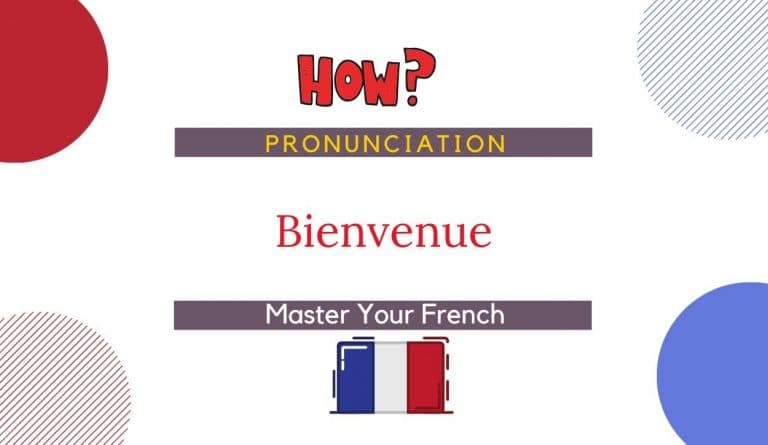How to pronounce Bienvenue in French?
Updated: 14 March, 2021 by Mylene in How to Pronounce ▪

Bienvenue is a feminine noun in French that means welcome in English.
Example:
- Nous te souhaitons la bienvenue chez nous: We welcome you at our place.
- Tu seras toujours bienvenue parmi nous: You will always be welcome among us.
- Bienvenue à tous!: Welcome to you all!
- Bienvenue en France!: Welcome to France!
French learners have always had many pronunciation challenges, whether it be new sounds for them, liaisons, silent letters, or just new words in French.
If you’re interested in taking your French pronunciation to the next level, check our article on how to pronounce French words.
How To Pronounce Bienvenue In French?
In French, the word Bienvenue is pronounced /bjɛ̃vny/ as follows:
- /b/ sound: the vocal cords vibrate while saying it. You can feel a puff of air against your hand when you say the sound /b/
- /j/ sound: it is pronounced like the beginning of the English word yes
- /ɛ̃/ sound: the mouth is opened and stretched horizontally, your tongue touches the front lower teeth
- /v/ sound: the vocal cords vibrate while saying it
- /y/ sound: the tongue touches the lower teeth
Click on the following link or play the video directly to learn the right pronunciation of “bienvenue” in French.
Spelling errors to avoid with Bienvenue in French
The most common mistake people make when using the word “bienvenue” is choosing the masculine ending when the feminine ending is needed. Check what follows to avoid many common spelling errors when writing the word “bienvenue”:
- If bienvenue is at the beginning of a sentence, you need to add the letter “e”. Bienvenue dans notre nouvelle maison: Welcome to our new house.
- If you wish welcome to someone you have to add the “e” (la bienvenue). Je te souhaite la bienvenue: I extend a warm welcome to you.
- When we say that someone is welcome in the sense of “that we welcome with pleasure, that comes at the right time”, then “welcome” is an adjective and agrees in gender and number. In the case of the masculine, it does not take an “e”. Ton frère est le bienvenu: your brother is welcome. In this example, the word “frère” is a masculine noun. That’s why there is no “e” at the end f the word “bienvenu”.
Let’s connect
To go beyond this effortless French pronunciation post, follow me on Instagram for daily French practice. Subscribe to my channel on YouTube for more awesome French content.
Check the pronunciation course if you’re looking to improve your French quickly. You can get enrolled today and boost your French learning to the next level!

